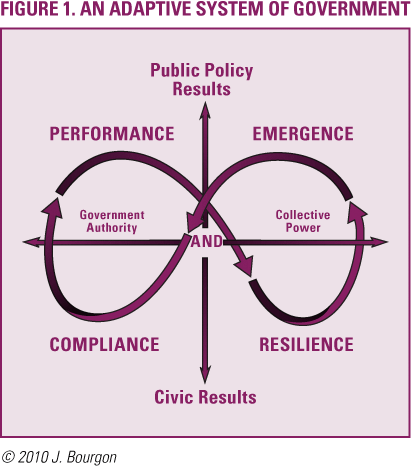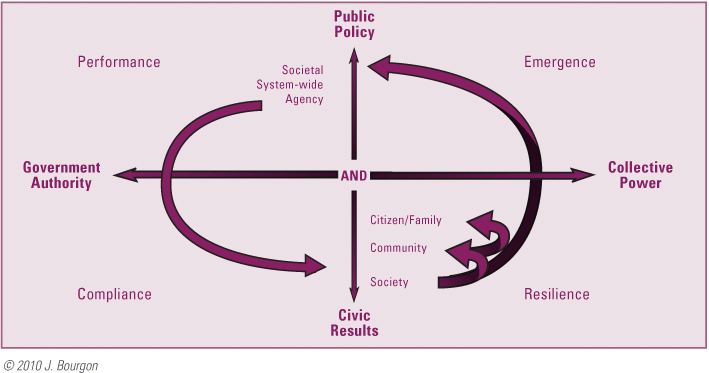The New Synthesis: Preparing Government for the Challenges of the 21st Century
ETHOS Issue 10, Oct 2011

THE NEW SYNTHESIS PROJECT
The New Synthesis Project1 was initiated in 2009 to support public sector practitioners who, in our time, are called upon to serve the public good and the collective interest, in the face of increasing complexity, uncertainty and volatility. It attempts to provide practitioners with an intellectual framework that would help to integrate, in a meaningful way, past practices of enduring value, lessons learned over the last 30 years of public sector reform, and the reality of practice in a post-industrial era.
Over the course of the project, close to 200 participants from academia and the world of public sector practice shared ideas about how to prepare government for the challenges of the 21st century. International roundtables and exploratory discussions took us to The Hague, Ottawa, Singapore, Rio de Janeiro and London.2 The project also brought us to Auckland, Wellington, Perth, Melbourne and Canberra, and we reached out to colleagues in Finland and the United States. We searched for and found powerful initiatives and promising practices from many countries. The insights from these deliberations pave the way for a New Synthesis of Public Administration, or if you prefer, a new narrative that can help to move public administration forward as a discipline and domain of practice beyond the concepts and practices inherited from the Industrial Age.3
The New Synthesis Framework presents public administration as a dynamic system with the capacity to adapt to changing circumstances and to co-evolve with society.
Despite differences in circumstances and diversity of background and perspectives, the project's participants achieved consensus on several key issues:
- The nature of governance is changing. There are substantial differences about serving in the 21st century.4 These differences transform the role of government, the role of public servants and the relationship between public institutions, public organisations and citizens.
- Past practices will not be enough. Public administration systems and approaches inherited from the past will be insufficient to prepare government for the challenges of the 21st century. Public servants serving today are facing an increasing number of complex public policy issues,5 and must contend with an environment characterised by uncertainties, volatility and cascading global crises.6 There are reasons to believe that the number and magnitude of disturbances will continue to increase.
- Virtual communities have real influence. They are the first generation of public servants to serve in a world where virtual communities transform the shape of public policy issues,7 as well as the context within which these challenges must be met and where people are all at once members of their communities, citizens of their country and citizens of the world.
- Governments cannot go it alone. An increasing number of public policy issues exceed the capacity of government working alone; they require the active contribution of people, families and multiple actors. Public results are a shared responsibility requiring a collective effort.8 A government-centric approach focused on efficiency and productivity must give way to a broader focus where the role of government is also to lever the collective capacity to achieve results of higher public value and at a lower overall cost for society.
New ideas, new capacities and new ways of doing things are needed to address complex issues and to find peaceful solutions to the intractable problems of our times.9 The industrial age promoted multiple separations, fragmentations and divisions to provide stability, improve efficiency and increase productivity. The 21st century will require multiple integrations, interactions and relationships to forge emergent solutions to our most daunting challenges.
A NEW NARRATIVE
A new narrative is needed to guide the actions and decisions of practitioners: one that integrates the role of government, people and society. The New Synthesis Framework aims to address this need. It presents public administration as a dynamic system with the capacity to adapt to changing circumstances and to co-evolve with society: government transforms society and is transformed by it.10

The New Synthesis Framework is an enabling framework; it does not provide answers but helps to frame the questions. It facilitates the exploration in practice of a broad range of possibilities open to government, and it helps to reveal the consequences that various choices entail. The framework helps practitioners to explore a space of possibilities.11
Delineated by four vectors, the framework (see Figure 1) argues that public results are a combination of public policy results and civic results, and that the role of public servants is to mediate and move the contribution of their organisations along both value added chains (the vertical vectors). It argues that the role of government extends beyond what government can do on its own. Instead, public servants need to work to leverage its collective capacity for better results (the horizontal vectors). This gives particular importance to the stewardship role of government to promote and defend the collective interest in all circumstances — both predictable and unpredictable — and in particular when the costs of failures would be borne by society as a whole.
The framework helps practitioners to explore a space of possibilities.
There are multiple tensions at the intersection of these vectors but this is also where the greatest potential for innovation is to be found, and where a new synergistic sharing of roles and responsibilities between people, government and society may be forged. Such a synthesis would represent a shift from a relatively closed concept of government, where public organisations are the primary provider of public services, to an open concept of governance, where public organisations constantly exchange and are part of their environment, and where the public, private and civic spheres co-evolve in a manner that supports the overall performance of society. It would require:
There are multiple tensions at the intersection of these vectors but this is also where the greatest potential for innovation is to be found.
- a strong emergence function to anticipate what might be, with the ability to take proactive action and tap collective intelligence so as to shape emergent solutions and co-create responses to complex policy issues;
- an efficient compliance function to set priorities, help forge societal and political consensus and conserve energy within a context of constrained actions and behaviours;
- an effective performance function to think across systems and work across boundaries, sectors and disciplines;
- a powerful resilience function to co-produce public results, encourage the active participation of citizens, families, communities as value creators, and to build the adaptive capacity of society to prosper and adapt in all circumstances.
The Singapore Prison System Case — The Power of an Inclusive Mental Map

The transformation of the Singapore Prison System (SPS) illustrates aspects of the New Synthesis framework in action. Confronted with overcrowding, high recidivism, increasing costs, staff shortages, low morale and poor public perception, the SPS transformed itself from "custodians" of prisoners to "captains in the lives" of the offenders they served. They did this by working with families, employers and other stakeholders to reintegrate former offenders into society successfully.1 In essence, they shifted from focusing on agency results to societal results.
Today, the prisons of Singapore are some of the most cost-effective corrections facilities in the world. Between 1998 and 2007, recidivism decreased from 44.4% to 26.5%. By leveraging the capacity of the community, the SPS achieved far more than it could on its own.2
- Leong, Lena, "The Story of Singapore Prison Service: From Custodians of Prisoners to Captains of Life", Paper presented at the NS6 International Roundtable, Ottawa, Canada, 4-5 May 2010.
- Ibid.
PREPARING PUBLIC SECTOR LEADERS FOR THE CHALLENGES OF THE 21ST CENTURY
The New Synthesis is a work in progress.12 To realise the potential of its insights in practice, our public sector leaders will need to develop several capacities:
- As public servants, they must have a commitment to serve, be firmly grounded in public sector values and have a deep philosophical understanding of the importance of serving the public good and collective interests.13
- As public administrators, they must be keepers of a public trust, exercising their duty under the rule of law and fulfilling their mission to the fullest by marshalling all the resources, resourcefulness and the power vested in them and their organisations.14
- As public sector managers, they should possess the same level of skills, knowledge and know-how required of their counterparts in other sectors. They need this to connect with, leverage, work across, co-create and co-produce public results of increasing value and at a lower overall cost for society.
- As public sector leaders, they must envision and anticipate what others have not yet seen, to give coherence to seemingly disparate elements and to give meaning to ambitious trajectories.15 They need to give voice to aspirations and help frame a narrative of hope deserving of support and conducive to collective actions.
A government-centric approach focused on efficiency and productivity must give way to a broader focus where the role of government is also to lever the collective capacity to achieve results of higher public value and at a lower overall cost for society.
CONCLUSION
Public administration embodies a concept about the relationship between government, people and society. As new ideas and new ways of doing things emerge, the old ways become unstuck. This provides an opportunity to modernise public administration and to propel our societies forward.
This transformation starts with people and, in particular, with those who have the very special responsibility of serving the public good and the collective interest. Over the coming months, efforts will be made to deepen the international conversation with those who participated in the project so far, and to broaden it to reach practitioners beyond the initial participating countries…and thus the journey continues.16
NOTES
- A book describing the project findings has recently been published: Bourgon, Jocelyne, A New Synthesis of Public Administration: Serving in the 21st Century, (Montreal: McGill-Queen's University Press, 2011)
- The Civil Service College was the senior partner and country coordinator for Singapore in the New Synthesis of Public Administration Project.
- Kettl, Donald F., The Global Public Management Revolution: A Report on the Transformation of Governance, (Washington, DC: The Brookings Institution, 2000)
- Denhardt, Janet Vinzant and Denhardt, Robert B, The New Public Service: Serving, Not Steering, (Armonk, NY: M.E. Sharpe, 2003)
- Klijn, Erik-Hans, "Complexity Theory and Public Administration: What's New?", Public Management Review, 10 (3) (2008), pp299-317
- NS6 Network, Preparing Government to Serve Beyond the Predictable: Singapore Roundtable Report, edited by Jocelyne Bourgon, (Ottawa: Public Governance International, 2010)
- Badger, Mark, Johnston, Paul, Stewart-Weeks, Martin, and Willis, Simon, The Connected Republic: Changing the Way We Govern, (San Jose, CA: Cisco, Internet Business Solutions Group, 2004)
- Cahn, Edgar S., No More Throw-Away People: The Co-Production Imperative, (Washington: Essential Books, 2004)
- Lam, Chuan Leong, "Managing Complexity and Uncertainties," ETHOS, no. 4 (April 2008); Kahane, Adam, Solving Tough Problems: An Open Way of Talking, Listening and Creating New Realities, (San Francisco: Berrett-Koehler Publishers, 2004)
- The author previously introduced some of the concepts behind the New Synthesis Framework in two articles for ETHOS. They are: Bourgon, Jocelyne, "Reclaiming Public Administration," ETHOS no. 4 (April 2008); Bourgon, Jocelyne, "Serving Beyond the Predictable," ETHOS no. 7 (January 2010).
- Bourgon, Jocelyne, "Exploring New Frontiers of Public Administration: The New Synthesis Project," Canadian Government Executive, 17 (3) (March 11), pp16-18
- Readers interested in the topic may wish to consult A New Synthesis of Public Administration: Serving in the 21st Century (Montreal: McGill-Queen's University Press). A lecture at the Civil Service College on 24 October 2011, "Governance in an Expanding Public Space", also expands on these ideas.
- Bourgon, Jocelyne, "Understanding the Public Leadership Environment: Preparing People to Serve People in the 21st Century", Keynote speech, Annual Conference of the Commonwealth Association of Public Administration and Management, Kemaman, Malaysia, 22 June 2009.
- Ibid.
- Ho, Peter, "Thinking About the Future: What the Public Service Can Do," ETHOS no. 7 (January 2010).
- More information on the project can be found at www.nsworld.org

